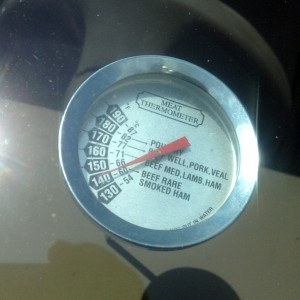By Dr. Sullivan Smith
COOKEVILLE – Hundreds of people die each year across the country from heat-related causes, but the encouraging news is that heat illness is 100 percent preventable. The American College of Emergency Physicians (ACEP) and Cookeville Regional Medical Center Emergency Department urge everyone dealing with extreme heat this summer to make a special point of looking out for those most susceptible to heat illness.

This was taken in only 85 degree weather on a partly cloudy day. Smoked ham! Imagine a day in the 90s!
“We all suffer when it gets brutally hot,” said Dr. Sullivan Smith, Emergency Department Medical Director at Cookeville Regional Medical Center. “But children and the elderly especially need to be careful of dehydration and possible heat illness. They also are often less able to help themselves when they begin to show symptoms of heat exhaustion or heatstroke. Parents or caregivers should make sure children get plenty to drink, and everyone should check in on elderly neighbors and family to make sure they are staying cool and hydrated.”
Heat-related illnesses include:
sunburn
heat cramps
heat rash
heat exhaustion
and heatstroke.
Of these, the two most serious conditions are heat exhaustion and heatstroke, both of which can be fatal. Symptoms of heat exhaustion include heavy sweating, muscle cramps, fatigue, weakness, cold or clammy skin, dizziness, nausea or vomiting, and fainting. Untreated heat exhaustion can progress to heat stroke quickly. Heat stroke occurs when a heat injury is associated with a change in the mental function. Heat stroke can cause unconsciousness within minutes and represents a true life threatening emergency.
“Because heat affects different people in different ways, it is vital to keep a close eye on anyone in hot conditions for any length of time since they may not realize they are in danger, “said Dr. Smith. “If you see someone acting strangely in the heat, offer them help as quickly as you can. We all need to look out for one another when the temperatures get dangerously hot. And again, remember to check on friends and neighbors, especially those who are not in good health or who may not have air conditioning.”
If you suspect someone is suffering from heat exhaustion:
Help the person to a cool place.
Lay the person down and raise their legs.
Give the person plenty of water to drink, or a sports drink containing electrolytes.
Even if the person recovers quickly, they should see a doctor.
If you suspect someone is suffering from heatstroke:
Immediately call 911 and arrange to have the person taken to the hospital.
Attempt to lower the person’s body temperature as quickly as possible by moving the person to a cool place;
wrap the person in a cold wet sheet, or place them in a cool shower, or place cool towels on various parts of the heat victim’s body.
Prevention:
Of course, it’s best to avoid the ill effects of heat-related illnesses altogether by taking a few simple precautions. Dr. Smith and ACEP suggest:
Hydrate: Drink plenty of water during the day, especially if you are engaged in any strenuous activity. Sports drinks are a good choice if you’re exercising or working in hot conditions, but water is a good way to hydrate as well. Caffeine and alcohol containing beverages are never good choices to prevent heat injuries. Both alcohol and caffeine cause your body to increase urine production which increases water losses.
Ventilate: Stay in a place where there is plenty of air circulating to keep your body cool. If you are indoors and don’t have access to air conditioning, open windows and use a fan.
Cover Up: Wear light-colored and loose-fitting clothing to avoid absorbing the sun’s light and trapping heat. Wear a hat to shield yourself from the sun, but once you feel yourself getting warm, remove any items covering your head which can trap heat close to your body.
Limit Activity: Heatstroke can occur in less than an hour when you are participating in strenuous activity during a hot day. If you feel yourself getting hot or light-headed, stop your activity and rest in a cool place out of the sun. Be sure to drink water or a sports drink before, during, and after any strenuous activity.
NEVER LEAVE CHILDREN OR PETS IN CARS! Every year there are tragic stories of preventable deaths of children who were trapped in a car and died of heat injuries.
“Cars can reach temperatures well over 175 degrees in just a very few minutes even on a cloudy day. Rolling down the windows or leaving the car running with the air conditioning on does not make it safe to leave a child or pet in a car. That decision to ‘run inside for a second to get something’ all too often ends up with deadly consequences. Sometimes children in car seats are forgotten, especially when they are asleep as an adult in a hurry exits the car,” said Dr. Smith.
Ways to prevent this deadly situation is to put items like a purse, wallet, cell phone, house keys, all packages, or anything else you will need in the back seat near the child. Putting a child’s toy in your lap or on the dash in front of you is another good idea to remind yourself. Dr. Smith recommends getting into the habit of looking throughout the vehicle as another good strategy. Besides looking for that child in the car seat, you should scan for things left in plain view that might temp a thief to break into your car.

